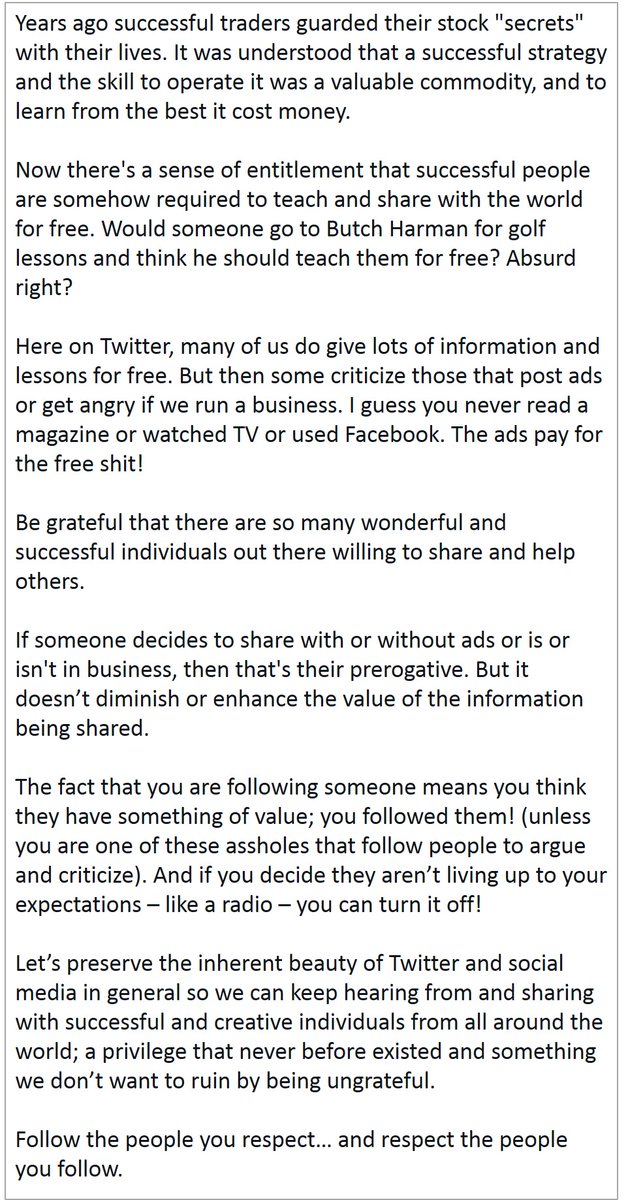Make no mistake, CONSISTENT big returns require:
1. Concentrated positions
2. High turnover
3. Small losses
4. Nailing down decent profits into strength
5. Never letting good size gains turn into losses
6. Defending breaking
7. Maintaining a positive reward/risk relationship
More from Mark Minervini
The word is sacrifice. You are not going to be the best at day trading, swing, value and growth investing. It will be amazing if you can master just one. And you only need one. So pick one and sacrifice the rest! There is no other way unless you want to suck at a bunch of things.
What is the single unavoidable thing you must do to be the best or great at one thing? One word?
— Mark Minervini (@markminervini) April 14, 2021
More from Markminervinilearnings
Compounding is amazing. Just 3 months into the year I'm having one of my best returns. That's because instead of arguing with the market, I made an adjustment and took what it was offering, and that allowed for rapid turnover that can add up pretty fast if you are concentrated.
Short term trading is what has worked best in this market. Until I see an alternative working better, I'm going to stick what is working like a charm.
— Mark Minervini (@markminervini) April 14, 2021
Key attributes of my trading this year:
1. Concentrated positions
2. Selective use of Leverage
3. High turnover
4. Super tight risk control
5. Selling into strength
6. Big positions almost exclusively directional
7. De-risking trades and free rolling often
1. Concentrated positions
2. Selective use of Leverage
3. High turnover
4. Super tight risk control
5. Selling into strength
6. Big positions almost exclusively directional
7. De-risking trades and free rolling often
JUST RELEASED - April U.S. Investing Championship results YTD - https://t.co/mN2Kl28gqh
— Mark Minervini (@markminervini) May 19, 2021
You May Also Like
Speech Delay is most common in children nowadays
In ancient times, our grandparents used to follow typical natural way of caring the needs of a child. All they used were more of natural products than chemical based for the growth of child.

One of major step followed was to feed Gurbach Jadd/ Vasa Kommu/ Acorus Calamus for initiating good speech ability in a child. This stem was needed to babies on Tuesdays and Sundays in mother's milk.
Vasa is feed to baby after the 1st bath on 12th day in week. Weekly only thrice it is fed and named as :
Budhwar - Budhi Vasa
Mangalwar - Vaak Vasa
Ravi Vaar - Aayush Vasa
This stem is burnt and rubbed against the grinding stone in mother's milk or warm water to get a paste

The procedure to make it is in the link
https://t.co/uo4sGp7mUm
It should not be given daily to the child. Other main benefits are
1. It clears the phlegm in child's throat caused due to continuous milk intake. It clears the tracts and breathing is effortless.
2. Digestion
For children who haven't got their speech and is delayed than usual should feed this vasa on these days in week atleast for 6months. Don't get carried away with this dialogue
"Some gain speech little late"
In ancient times, our grandparents used to follow typical natural way of caring the needs of a child. All they used were more of natural products than chemical based for the growth of child.

One of major step followed was to feed Gurbach Jadd/ Vasa Kommu/ Acorus Calamus for initiating good speech ability in a child. This stem was needed to babies on Tuesdays and Sundays in mother's milk.
Vasa is feed to baby after the 1st bath on 12th day in week. Weekly only thrice it is fed and named as :
Budhwar - Budhi Vasa
Mangalwar - Vaak Vasa
Ravi Vaar - Aayush Vasa
This stem is burnt and rubbed against the grinding stone in mother's milk or warm water to get a paste

The procedure to make it is in the link
https://t.co/uo4sGp7mUm
It should not be given daily to the child. Other main benefits are
1. It clears the phlegm in child's throat caused due to continuous milk intake. It clears the tracts and breathing is effortless.
2. Digestion
For children who haven't got their speech and is delayed than usual should feed this vasa on these days in week atleast for 6months. Don't get carried away with this dialogue
"Some gain speech little late"
















